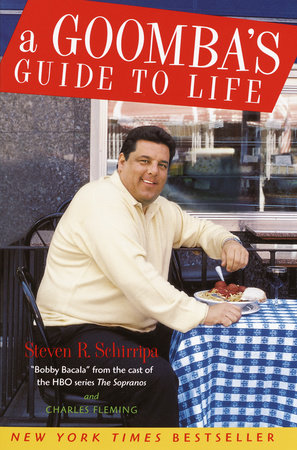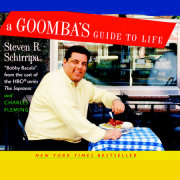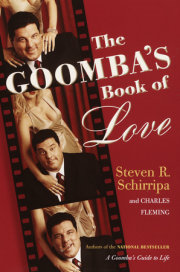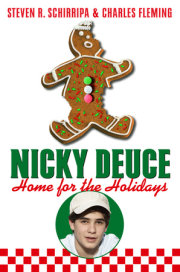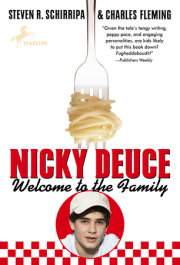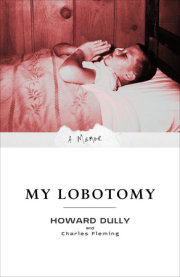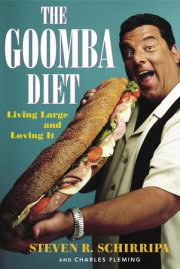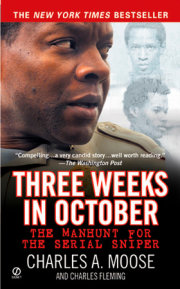What's a goomba? Who's a goomba? What's the difference between a goomba and a gangster? What's the difference between a goomba and a regular Italian? Are there goombas in outher countries? Is there any such thing as a Jewish goomba, or a black goomba, or an Episcopalian goomba?
Keep your shirt on. I'm gonna lay it out for you here. This is the lesson on goomba.
A goomba is a certain kind of Italian-American, probably born on the east coast—New YOrk, New Jersey, Boston, Rhode Island—probably third generation from the old country. He's not a gangster. He's not a wise guy, or a made man, or a good fella, or a member of the Family—but he knows those guys, or guys like that, and some of them know him. He's Italian through and through, but he's a special kind of Italian-American hybrid. He's not old country Italian. There are no goombas in other countries, even Italy. There may be some kind of equivalent—some kind of tough guy from Iceland or Russia or somewhere—but the only true goomba is your Italian-American goomba.
You know the stereotype. It's the fat guy sitting at the corner social club, drinking espresso and playing cards and eating a big plate of soggy macaroni. He's got his napkin tucked into his collar. He's wearing a pair of baggy black pants, a pair of patent leather shoes, and one of those guinea shirts, the sleeveless T-shirts that some guys use as underwear. He has nine gold chains hanging from his neck. He's got pinky rings on all three pinkies. The look on his face says "Moron." This guy doesn't have a job, or maybe he's a petty criminal of some kind, because that's the only work he's smart enough to do. He's almost mobbed up. The only exercise he ever gets is maybe lifting some weights and hoisting that fork full of macaroni. If he talks, he only says something like, "What are you looking at?"
That's the cliché. And like every cliché, it's partly right. but I myself am a goomba—and I'm not
any of that stuff. I'm a college graduate. I know how to read a book. I don't sit around all day playing cards and sucking garlic. I don't beat my wife. I've never been in jail. I don't play the ponies or the nubmers. I have never taken out a contract on anyone. But I'm a goomba, right to the heart, and I'm proud of it.
Some Italians take offense if you call them a goomba. Especially if you say it the wrong way. It's kind of like how a black guy can use the "N" word to another black guy. Or how a black guy can call his friend "blood." Or how a certain kind of hillbilly can call someone a "redneck," or how a guy from the Midwest can call someone an "Okie." You say it with a smile, you might get a laugh. You say it any other way, or you say it and you're not an Okie or a redneck yourself. . . you're gonna get your clock cleaned.
The word "goomba" itself is a little confusing. No one knows where it really comes from. Most people think it started off as the word "compadre," which is a term of respect. You can use it to refer to your godfather, your protector, your older cousin or older brother or uncle. From "compadre," it got shortened to "compa," which got twisted into "gomba," which got turned into "goomba."
If this sounds a little far fetched, you should know right now that goombas do that with words. Everything gets chopped up, chopped down and turned into a slang version of the original word. No goomba says "pasta e fagioli" when he means a soup made of noodles and beans. He says, "pasta fazool." No goomba says "mozzarella." It's always, "mozza-rell." No one says "proscuitto." It's just, "pro-shoot." Even English words get the treatment. No one says "one hundred dollars," when they mean $100. They may say, a c-note or "a hundge." As in, "I gave the guy a c-note," or, "This guys into me for two hundge." Even the word "wop" is supposed to be a short version of the Italian word "guapo," which means "handome." It started as a compliment, but it got turned into an insult. Some people even said WOP stands for without papers, a reference to their recent immigrant status.
That has almost happened with the word "goomba." When used by non-goombas, it can be a derogatory word. Along with some of those other derogatory words that ignorant people sometimes use to describe the goomba.
Goomba is not "wop." It's not "guinea." It's not "dago." These terms are always offensive to an Italian-American, whether he's a goomba or not. They are words used by non-Italians to insult Italians. It is not smart to do this. You shouldn't use these words around a goomba unless you are a masochist and have excellent health insurance. Somebody's gonna get hurt, and it ain't gonna be the goomba.
Better stick to "goomba," and better use it the right way.
Copyright © 2002 by Steven R. Schirripa and Charles Fleming. All rights reserved. No part of this excerpt may be reproduced or reprinted without permission in writing from the publisher.

